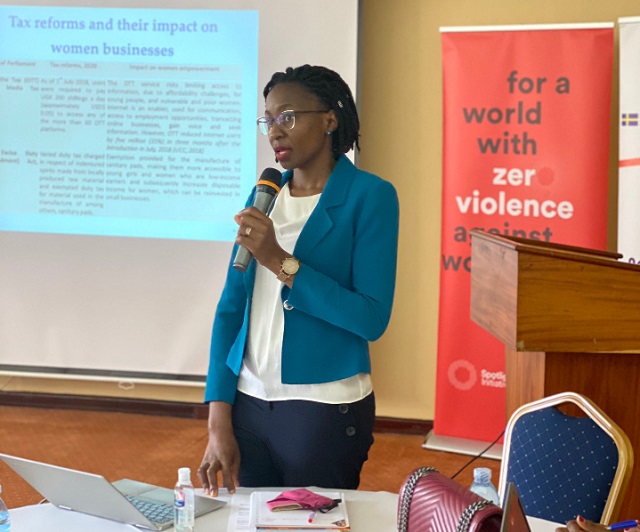
Kampala, Uganda | Julius Businge | Any effort geared towards supporting businesses is highly needed at this time for the economy to fast recover from the COVID-19 crisis.
A group of civil society organisations under their umbrella body, Civil Society Budget Advocacy Group (CSBAG) has listed challenges women face in business and offered recommendations.
While giving a presentation on gender and taxation (proposals for reform to support women businesses in Uganda) at a hotel in Kampala on March 18, the group said, women in Uganda face challenges related to registration and licensing formalities, which they said can be inhibitive.
This process is cumbersome and requires one to get tax identification number, VAT registration, certificate of incorporation and National Social Security Fund registration.
Women engaged in business may not formalise because of the costs involved in this process.
The other challenge is, limited knowledge on tax compliance requirements which is further compromised by limited knowledge on maintaining books of accounts, filing returns, and engaging with tax officials who are intimidating at times.
“Cost of formalising a small business may represent an absolute barrier majorly because in some instances, women do not control their cash flows in the household, imposing an insurmountable burden,” Sophie Nampewo Njuba, a senior budget policy specialist at CSBAG said.
The other deadlock is limited access to finance which is worsened by high interest rates in the market.
There are also small and informal charges including market dues, user fees which are likely to have gendered effects.
As part of the solutions, the group says government should conduct research on the impact of taxes and other fees on women businesses and design policies to remedy this; that CSOs can complement government’s efforts to conduct gender-disaggregated tax incidence analysis and to evaluate the differential impacts of taxes on women and men in terms of sharing tax burdens and influence consumption preferences.
Government should implement a legal aid and paralegal project to provide free advice to women entrepreneurs on matters arising from the operation of their enterprises.
Government should also set segmented progressive tax policies by lowering tax rates for small business owners.
Encourage women owned small businesses to use the new Electronic Fiscal Receipting and Invoicing System (EFRIS); impose zero-rate VAT on basic goods and services that support household supplies and promote gender friendly tax education embedded in tax-related policies.
Uganda leads Africa in countries that have a high number of women-owned enterprises as a percentage of total business owners in a group of 58 markets around the world profiled by the Mastercard Index of Women Entrepreneurs (MIWE) 2019.
Uganda is ranked first at 38.2% followed by Ghana with 37.9%, and Botswana third with 36%, Malawi is seventh 31.1%, and Angola ninth with 30.3%.
 The Independent Uganda: You get the Truth we Pay the Price
The Independent Uganda: You get the Truth we Pay the Price



